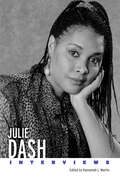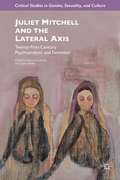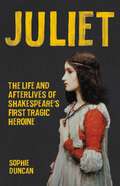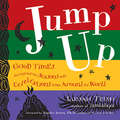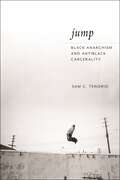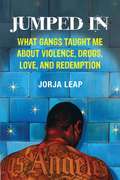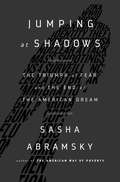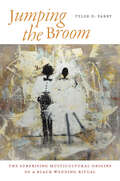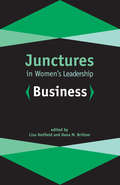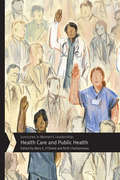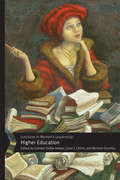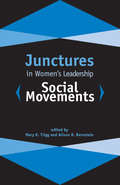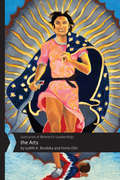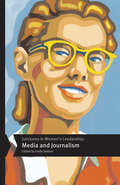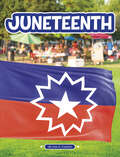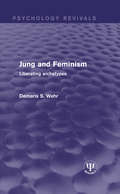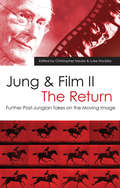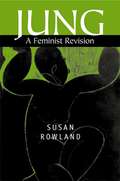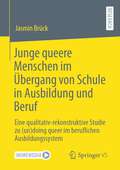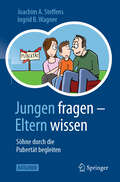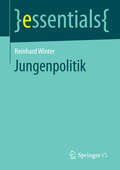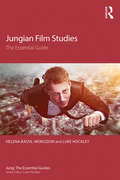- Table View
- List View
Julie Dash: Interviews (Conversations with Filmmakers Series)
by Kameelah L. MartinThis collection of interviews with Julie Dash (b. 1952) offers an in-depth exploration of the life, career, and creative processes of one of the most groundbreaking filmmakers in American cinema. Dash, whose landmark film Daughters of the Dust (1991) became the first feature by an African American woman to receive a wide theatrical release in the United States, has continuously pushed the boundaries of cinematic representation, exploring African American history, culture, and identity through a distinctly poetic and visionary lens.Dash’s use of Black feminist narrative and her ability to supplant the status quo of Black women’s representation in cinema aligned with the evolution of Black women’s writing and visual arts that exploded in the eighties and early nineties. Starting with her debut film Illusions (1982) and touching upon other works such as Praise House (1991), the eighteen interviews collected in this volume weave together the stylistic integrity and unconventional model of storytelling that Dash thoughtfully midwives into existence. Julie Dash: Interviews will put students, scholars, and admirers of Dash’s oeuvre in close proximity to her creative thought process and influences as well as make accessible an archive of conversations in which she discusses the longevity of her career, intergenerational shifts, and the reception of her work across the globe.
Juliet Mitchell and the Lateral Axis: Twenty-first Century Psychoanalysis And Feminism (Critical Studies In Gender, Sexuality, And Culture Ser.)
by Robbie Duschinsky Susan WalkerThis volume fills the gap in books dedicated to the ideas of ground-breaking theorist Juliet Mitchell. Essays from internationally renowned scholars address themes that cross-cut her oeuvre: equality, violence, collective movements, subjectivity, sexuality and power. Mitchell herself contributes a chapter and an afterward.
Juliet: The Life and Afterlives of Shakespeare's First Tragic Heroine
by Sophie DuncanThe enduring cultural legacy of Shakespeare&’s Juliet Capulet — a history "as vital and provocative as the character herself" (Literary Review).Romeo and Juliet may be the greatest love story ever told, but who is Juliet? Demure ingénue? Or dangerous Mediterranean madwoman? From tearstained copies of the First Folio to Civil War-era fanfiction, Shakespeare&’s star-crossed heroine has long captured our collective imagination. Juliet is her story, traced across continents through four centuries of history, theatre, and film. As Oxford Shakespeare scholar Sophie Duncan reveals, Juliet&’s legacy stretches beyond her literary lifespan into a cultural afterlife ranging from enslaved African girls in the British Caribbean to the real-life Juliets of sectarian violence in Bosnia and Belfast. She argues that our dangerous obsession with the beautiful dead teenager and Juliet&’s meteoric rise as a defiant sexual icon have come to define the Western ideal of romance. Wry and inventive, Juliet is a tribute to fiction&’s most famous teenage girl who died young, but who lives forever.
Julius Caesar: A Life
by Antony KammThis is a fresh account of Julius Caesar - the brilliant politician and intriguing figure who became sole ruler of the Roman Empire. Julius Caesar examines key figures such as Marius, Sulla, Cicero, Mark Antony, Gaius Octavius (emperor Augustus), Calpurnia and Cleopatra, as well as the unnamed warriors who fought for and against him, and politicians who supported and opposed him. Including new translations from classical sources, Antony Kamm sets Caesar’s life against the historical, political and social background of the times and addresses key issues: Did Caesar destroy the Republic? What was the legality of his position and the moral justifications of his actions How good a general was he? What was his relationship with Cleopatra? Why was he assassinated? What happened next? This is Caesar – the lavish spender, the military strategist, a considerable orator and historical writer, and probably the most influential figure of his time - in all his historical glory. Students of Rome and its figures will find this an enthralling, eye-opening addition to their course reading.
Jump Up: Good Times throughout the Seasons with Celebrations from Around the World
by Luisah TeishVirtually all peoples of the world celebrate the passage of seasons. The continual movement of time through winter, spring, summer, and autumn has framed human experience and profoundly affected the lives of individuals and communities for many thousands of years.Celebrations that mark the seasons are rich with food, music, dance, offerings, and the reenactment of myth. Jump Up (titled after a Caribbean phrase that is used to describe a celebration) is meant to reacquaint readers with these traditions and to give them suggested practices for honoring past traditions in new ways.African traditions form the core of the book, and ceremonies and practices from Europe, Asia, the Americas, and the South Pacific are interwoven throughout. Readers will encounter the origin of well-known holidays and, at the same time, learn about others that are unknown in the Western world. Some of the more familiar cultural-based seasonal holidays that appear in this book include Christmas, New Year's Day, Mardi Gras, Palm Sunday, Easter, May Day, Day of the Dead, and the African American holiday of Kwaanza.Each season's story is accompanied by recipes, suggestions and guidelines for rituals to help readers create their own celebrations. One winter ritual, complete with instructions, is the Ritual of the Cleansing Fire, and an autumn ritual is the Building of the Autumn Equinox Altar. The recommended rituals are generic, and they can be done in conjunction with or in place of traditional holidays. Laced with myth, folklore, and poetry, Jump Up celebrates life, enlivens the spirit, and strengthens the bonds of community.
Jump: Black Anarchism and Antiblack Carcerality
by Sam C. TenorioAsks how we can better understand a politics of refusalWriting a new story of Black politics, Jump emerges from the practice of enslaved Africans jumping overboard off their slavers’ ships. Reading against the narrative that depoliticizes and denigrates the leaps of the enslaved as merely suicidal symptoms of chattel slavery and the Middle Passage, Sam C. Tenorio demonstrates how bringing these jumps to bear on the foundations of Black politics allows us to rethink a politics of refusal.In a period of increasing political mobilization against police brutality and mass incarceration, Jump attends to the layers of confinement that constitute the racial and gendered hierarchies of the antiblack world. Centering radical acts too often relegated to the periphery of Black politics, Tenorio proposes a Black anarchist politics of refusal that helps us to think dissent anew.Tracing iterations of the jump through the carceral wake of the slave ship, Tenorio explores the voyages of the Black Star Line in defiance of the bordered authority of the nation state, the Watts Rebellion of 1965 against the property relation of ghettoization, and Assata Shakur’s abscondence from prison to Cuba. Ultimately, Tenorio argues that considering the jump as a progenitor of Black politics deepens and widens our conceptualization of the Black radical tradition and introduces a paradigm-shifting attention to Black anarchism.
Jumped In: What Gangs Taught Me about Violence, Drugs, Love, and Redemption
by Jorja LeapWhen Jorja Leap began studying Los Angeles gang violence in 2002, she encountered a myriad of proposed solutions to the seemingly intractable "gang problem" and set out to discover what was really going on. The stakes--then and now--could not be higher: a child or teenager is killed by gunfire every three hours and homicide is the leading cause of death for African American males between the ages of fifteen and thirty-four. In Jumped In, Leap brings us stories that reach behind the statistics and sensational media images to the real lives of those stuck in-and trying to escape-"la vida loca." With the eye of an anthropologist and a heart full of compassion, this small, tough woman from UCLA travels some of the most violent and poverty-stricken neighborhoods, riding along in police cruisers and helicopters, and talking with murderers and drug dealers, victims and grieving mothers. Through oral histories, personal interviews, and eyewitness accounts of current and former gang members, as well as the people who love and work alongside them, readers come to understand both the people pulled into gangs and those trying mightily to forge alternatives and help their community. In delving into the personal lives of current and former gang members, Leap aims not only to find out what leads them to crime and how to deal most effectively with gang activity, but also to hear the voices of those most often left out of the political conversation and to learn from leaders who offer a different kind of hope, through community outreach and jobs programs. As she forges lasting friendships in this community and becomes immersed in others' triumphs and tragedies, Leap's personal and professional lives intersect in sometimes incendiary ways. With a husband in the Los Angeles Police Department and a daughter in adolescence, she faces plenty of family dilemmas herself. Ultimately, Jumped In is a chronicle of the unexpected lessons gang members taught her while she was busily studying them, and how they changed her forever.
Jumping at Shadows: The Triumph of Fear and the End of the American Dream
by Sasha AbramskyWhy is an unarmed young black woman who knocks on a stranger's front door to ask for help after her car breaks down perceived to be so threatening that he shoots her dead? Why do we fear infrequent acts of terrorism more far more common acts of violence? Why does a disease like Ebola, which killed only a handful of Americans, provoke panic, whereas the flu--which kills tens of thousands each year--is dismissed with a yawn?Jumping at Shadows is Sasha Abramsky's searing account of America's most dangerous epidemic: irrational fear. Taking readers on a dramatic journey through a divided nation, where everything from immigration to disease, gun control to health care has become fodder for fearmongers and conspiracists, he delivers an eye-popping analysis of our misconceptions about risk and threats. What emerges is a shocking portrait of a political and cultural landscape that is, increasingly, defined by our worst fears and rampant anxieties.Ultimately, Abramsky shows that how we calculate risk and deal with fear can teach us a great deal about ourselves, exposing deeply ingrained strains of racism, classism, and xenophobia within our culture, as well as our growing susceptibility to the toxic messages of demagogues.
Jumping the Broom: The Surprising Multicultural Origins of a Black Wedding Ritual
by Tyler D. ParryIn this definitive history of a unique tradition, Tyler D. Parry untangles the convoluted history of the "broomstick wedding." Popularly associated with African American culture, Parry traces the ritual's origins to marginalized groups in the British Isles and explores how it influenced the marriage traditions of different communities on both sides of the Atlantic Ocean. His surprising findings shed new light on the complexities of cultural exchange between peoples of African and European descent from the 1700s up to the twenty-first century. Drawing from the historical records of enslaved people in the United States, British Romani, Louisiana Cajuns, and many others, Parry discloses how marginalized people found dignity in the face of oppression by innovating and reimagining marriage rituals. Such innovations have an enduring impact on the descendants of the original practitioners. Parry reveals how and why the simple act of "jumping the broom" captivates so many people who, on the surface, appear to have little in common with each other.
Junctures in Women's Leadership: Business
by Dana M. Britton Laura Lovin Carolina Alonso Bejarano Rosemary Ndubuizu Stina Soderling Amanda Roberti Professor Lisa Hetfield Katie Mccollough Crystal Bedley Grace HowardHow have women managed to break through the glass ceiling of the business world, and what management techniques do they employ once they ascend to the upper echelons of power? What difficult situations have these female business leaders faced, and what strategies have they used to resolve those challenges? Junctures in Women's Leadership: Business answers these questions by highlighting the professional accomplishments of twelve remarkable women and examining how they responded to critical leadership challenges. Some of the figures profiled in the book are household names, including lifestyle maven Martha Stewart, influential chef Alice Waters, and trailblazing African-American entrepreneur Madame C.J. Walker. Others have spent less time in the public eye, such as Johnson & Johnson executive JoAnn Heffernan Heisen, Verizon Senior Vice President Diane McCarthy, Wells Fargo technology leader Avid Modjtabai, Xerox CEO Ursula Burns, Spanx founder Sara Blakely, inventor Jane ni Dhulchaointigh, engineering firm President Roseline Marston, Calvert Investments President and CEO Barbara Krumsiek, and Merrill Lynch executive Subha Barry. These women, from diverse backgrounds, have played important roles in their respective corporations and many have worked to improve the climate for women in male-dominated industries. This is a book about women who are leading change in business. Their stories illuminate the ways women are using their power and positions--whether from the middle ranks or the top, whether from within companies or by creating their own companies. Each case study in Junctures in Women's Leadership: Business includes a compelling and instructive story of how a woman business leader handled a critical juncture or crisis in her career. Not only does the book offer an inspiring composite portrait of women succeeding in the business world, it also provides leadership lessons that will benefit readers regardless of gender.
Junctures in Women's Leadership: Health Care and Public Health (Junctures: Case Studies in Women's Leadership)
by Elizabeth Ryan Elizabeth Hoover Mary E. O'Dowd Dawn Thomas Denise Rodgers Mary Wachter Ann Marie Hill Raquel Mazon Jeffers Christina Tan Heather Howard Patricia Findley Colleen Blake Alexander Bartke Christina Chesnakov Grace Ibitamuno Erica Reed Akanksha Arya Carson Clay Suzanne Willard Jacqueline Hunterdon-AndersonJunctures in Women’s Leadership: Health Care and Public Health offers an eclectic compilation of case studies telling the stories of women leaders in public health and health care, from Katsi Cook, Mohawk midwife, to Virginia Apgar, Katharine Dexter McCormick and Florence Schorske Wald, to Marilyn Tavenner, Suerie Moon, and more. The impact of their work is extraordinarily relevant to the current public discourse including subjects such as the global COVID-19 pandemic, disparities in health outcomes, prevention of disease and the impact of the Affordable Care Act. The leadership lessons gleaned from these chapters can be applied to a broad array of disciplines within government, private business, media, philanthropy, pharmaceutical, environmental and health sectors. Each chapter is authored by a well versed and accomplished woman, demonstrating the book’s theme that there are many paths within health care and public health. The case study format provides an introductory section providing biographical and historical background, setting the stage for a juncture, or decision point, and the resolution. The women are compelling characters and worth knowing.
Junctures in Women's Leadership: Higher Education (Junctures: Case Studies in Women's Leadership)
by Patricia Pelfrey Carol T. Christ Elizabeth Kiss Karen Lawrence Leslee Ann Fisher Carmen Twillie Ambar Michele Ozumba Susan Bourque Marilyn Schuster Karen Stubaus Jacquelyn Sue Litt Maureen MahoneyJunctures in Women's Leadership: Higher Education illuminates the careers of twelve women leaders whose experiences reveal the complexities of contemporary academic leadership through the intersection of gender, race, and institutional culture. The chapters combine interviews and research to create distinct case studies that identify the obstacles that challenged each woman's leadership, and the strategies deployed to bring about resolution. The research presented in this volume reveals not only theoretical factors of academic leadership, but also real time dynamics that give the reader deeper insights into the multiple stakeholders and situations that require nimble, relationship-based leadership, in addition to intellectual competency. With chapters written by many of today's leading women in higher education, this book brings into sharp focus the unique attributes of women leaders in the academy and adds a new dimension of analysis to the field of women’s leadership studies. Women leaders interviewed in this volume include Bernice Sandler, Juliet Villarreal García, and Johnnetta Betsch Cole.
Junctures in Women's Leadership: Social Movements
by Blanche Wiesen Cook Beverly Guy-Sheftall Bridget Gurtler Kathe Sandler Laura Lovin Mary K. Trigg Kim Lemoon Carolina Alonso Bejarano Alison R. Bernstein Miriam Tola Rosemary Ndubuizu Jeremy Lamaster Jo E. Butterfield Taida Wolfe Stina SoderlingFrom Eleanor Roosevelt to feminist icon Gloria Steinem to HIV/AIDS activist Dazon Dixon Diallo, women have assumed leadership roles in struggles for social justice. How did these remarkable women ascend to positions of influence? And once in power, what leadership strategies did they use to deal with various challenges? Junctures in Women's Leadership: Social Movements explores these questions by introducing twelve women who have spearheaded a wide array of social movements that span the 1940s to the present, working for indigenous peoples' rights, gender equality, reproductive rights, labor advocacy, environmental justice, and other causes. The women profiled here work in a variety of arenas across the globe: Planned Parenthood CEO Cecile Richards, New York City labor organizer Bhairavi Desai, women's rights leader Charlotte Bunch, feminist poet Audre Lorde, civil rights activists Daisy Bates and Aileen Clarke Hernandez, Kenyan environmental activist Wangari Maathai, Nicaraguan revolutionary Mirna Cunningham, and South African public prosecutor Thuli Madonsela. What unites them all is the way these women made sacrifices, asked critical questions, challenged injustice, and exhibited the will to act in the face of often-harsh criticism and violence. The case studies in Junctures in Women's Leadership: Social Movements demonstrate the diversity of ways that women around the world have practiced leadership, in many instances overcoming rigid cultural expectations about gender. Moreover, the cases provide a unique window into the ways that women leaders make decisions at moments of struggle and historical change.
Junctures in Women's Leadership: The Arts (Junctures: Case Studies in Women's Leade #3)
by Judith K. Brodsky Ferris OlinIn this third volume of the series Junctures: Case Studies in Women’s Leadership, Judith K. Brodsky and Ferris Olin profile female leaders in music, theater, dance, and visual art. The diverse women included in Junctures in Women's Leadership: The Arts have made their mark by serving as executives or founders of art organizations, by working as activists to support the arts, or by challenging stereotypes about women in the arts. The contributors explore several important themes, such as the role of feminist leadership in changing cultural values regarding inclusivity and gender parity, as well as the feminization of the arts and the power of the arts as cultural institutions. Amongst the women discussed are Bertha Honoré Palmer, Louise Noun, Samella Lewis, Julia Miles, Miriam Colón, Jaune Quick-To-See Smith, Bernice Steinbaum, Anne d’Harnoncourt, Martha Wilson, Jawole Willa Jo Zollar, Kim Berman, Gilane Tawadros, Joanna Smith, and Veomanee Douangdala.
Junctures in Women’s Leadership: Media and Journalism (Junctures: Case Studies in Women's Leadership)
by Elizabeth L. Toth Linda Steiner Nahed Eltantawy Tracy Everbach Michelle Duster Stine Eckert Amy Jordan Paromita Pain Sadie Couture Constance Mitchell Ford Kevin Blackistone Shannon Scovel Chloe TeraniThe news industry is still dominated by men. Yet women have exercised leadership in journalism and related media professions in a variety of ways, from moral leadership to experimenting with structural and technological innovations and pioneering new formats to serve new audiences. This book offers a robust account of women’s leadership in journalism, looking at what motivated women to become media leaders, the obstacles they overcame, and the strategies they used to solve problems and handle crises. This book offers profiles of inspiring women in prominent media positions from the nineteenth century to today, beginning with trailblazers like abolitionist publisher Mary Ann Shadd and Memphis Free Speech anti-lynching editor Ida B. Wells. The book takes an in-depth look at the leadership styles of well-known media moguls like Oprah Winfrey and Washington Post publisher Katharine Graham. Other chapters highlight women now emerging as media leaders, such as digital media executive S. Mitra Kalita and Iman Zawahry, a Muslim hijabi filmmaker. Bringing together cases from print, broadcast, public relations, film, and digital media, this book offers useful insights into how to be an effective leader in an ever-changing industry.
Juneteenth (Tradiciones y celebraciones)
by Lisa A. CraytonDescubre y celebra Juneteenth con esta exploración fáctica de la historia, los eventos y las tradiciones de la festividad. Discover and celebrate Juneteenth with this factual exploration of the history, events, and traditions of the holiday.
Jung and Feminism: Liberating Archetypes (Psychology Revivals)
by Demaris S. WehrJung, in contrast to Freud, has typically been considered more sympathetic to women largely because of his emphasis on the feminine as a way of being in the world and on the ‘anima’, the unconscious feminine aspect of male personality. Feminists, however, have viewed Jung’s whole notion of the ‘feminine’ with suspicion, seeing it as a projection of male psyche and not an authentic understanding of female humanity. For Demaris Wehr both feminism and Jungian psychology have been guiding forces, and in this book, originally published in 1988, she mediates between feminists and classical Jungians – two groups historically at odds. She faces squarely the male-centred assumptions of some Jungian concepts and challenges Jung’s claims for the universality and purely empirical basis of his work, but nevertheless maintains an appreciation for the value of Jung’s understanding of human nature and the process of individuation. By bringing the insights of feminist theology to bear on the seemingly unbridgeable gap between analytical psychology and feminism, she succeeds in reclaiming Jungian psychology as a freeing therapy for women and reveals it as the ultimately liberating vision its founder intended it to be.
Jung and Film II: Further Post-Jungian Takes on the Moving Image
by Luke Hockley Christopher HaukeSince Jung and Film was first published in 2001, Jungian writing on the moving image in film and television has accelerated. Jung and Film II: The Return provides new contributions from authors across the globe willing to tackle the broader issues of film production and consumption, the audience and the place of film culture in our lives. As well as chapters dealing with particular film makers such as Maya Derren and films such as Birth, The Piano, The Wrestler and Breaking the Wave, there is also a unique chapter co-written by documentary film-maker Tom Hurvitz and New York Jungian analyst Margaret Klenck. Other areas of discussion include: the way in which psychological issues come under scrutiny in many movies the various themes that concern Jungian writers on film how Jungian ideas on psychological personality types can be applied in fresh ways to analyse a variety of characters. The book also includes a glossary to help readers with Jungian words and concepts. Jung and Film II is not only a welcome companion to the first volume, it is an important stand- alone work essential for all academics and students of analytical psychology as well as film, media and cultural studies.
Jung: A Feminist Revision
by Susan RowlandThis book is designed for the new reader of Jung, for all those engaged with feminism and for researchers. Two chapters sketch the man, his life with women, and then carefully introduce all his important ideas. C. G. Jung loved the feminine all his life. The feminine is the pivotal fulcrum of both his work and his psyche. Yet Jung was certainly not a feminist in the sense of promoting women's participation in the world. This book not only introduces Jung to those who have never before encountered his ideas; it applies the full range of feminist research to remedy the neglect.
Junge Männer in Deutschland: Einstellungen junger Männer mit und ohne Zuwanderungsgeschichte zu Gender und LSBTI (Edition Centaurus – Jugend, Migration und Diversity)
by Katja Sabisch Katja Nowacki Silke RemiorzDer Band untersucht die Werteorientierung junger Männer mit und ohne Zuwanderungsgeschichte zu Geschlecht, Gleichberechtigung und LSBTI unter Berücksichtigung von Beziehungsmustern und Sozialisation.
Junge queere Menschen im Übergang von Schule in Ausbildung und Beruf: Eine qualitativ-rekonstruktive Studie zu (un)doing queer im beruflichen Ausbildungssystem
by Jasmin BrückDie Situation von queeren Menschen in Deutschland ist bereits in verschiedenen Studien erforscht worden. Diese belegen, dass Menschen mit nicht-heterosexuellen Orientierungen und/oder nicht cisgeschlechtlichen Zugehörigkeiten unterschiedliche Erfahrungen machen, die von Anerkennung bis hin zu Ausgrenzungen, Benachteiligungen und unterschiedlichen Gewaltformen reichen. Dieses Buch greift diese Ausgangslage auf und spezifiziert eine Perspektive auf junge queere Menschen, die nicht nur aufgrund ihres Queerseins, sondern auch aufgrund verzögerter Bildungszugänge und -abschlüsse sowie prekären Beschäftigungsaussichten eine marginalisierte Position innerhalb einer normativ geprägten Gesellschaft einnehmen.Zentral hierbei ist eine subjektorientierte Perspektive auf die Lebenssituation von jungen queeren Menschen im Schulberufssystem und Übergangssystem. Hierbei werden Diskriminierungsverhältnisse hinsichtlich geschlechtlicher und sexueller Vielfalt sowie klassenbezogener Benachteiligung analysiert und diskutiert. In diesem Zusammenhang werden zentrale Diskurse zu Queerness und sozialer (Un)Gerechtigkeit sowie damit verbundene Anerkennungsordnungen in den Blick genommen.
Jungen fragen - Eltern wissen: Söhne durch die Pubertät begleiten
by Joachim A. Steffens Ingrid B. WagnerWorüber und wie man mit Söhnen im Gespräch bleiben kann, das erfahren Eltern in diesem Buch. Die frühe Pubertät ist eine ideale Zeit für vertrauensvolle Gespräche zwischen Eltern und Söhnen. Doch können Väter und Mütter ihren Söhnen nur das vermitteln, was sie selbst wissen, erfahren haben und was insbesondere Väter als Mann repräsentieren bzw. welches Männerbild sie verinnerlicht haben. Das Autorenteam erklärt, welche faszinierenden Vorgänge und Veränderungen während der Pubertät im Jungenkörper stattfinden, warum Jungen so und nicht anders darauf reagieren. Für Väter und Mütter, die mit ihren Söhnen in Beziehung bleiben möchten und sie auf der aufregenden Reise durch die Pubertät begleiten. Auch für Berufsgruppen aus Schule und Jungendarbeit, die mit Jungen ab 11 Jahren arbeiten. Wunderbar illustriert von Bastian Klamke.
Jungen und Männer als Betroffene sexualisierter Gewalt (Sexuelle Gewalt und Pädagogik #7)
by Clemens Fobian Rainer UlfersDas Buch bietet einen Rückblick auf den ab 2010 öffentlich und wissenschaftlich geführten Diskurs um Jungen und Männer als von sexualisierter Gewalt Betroffene. Die aktuellen Diskussionsstränge werden zusammengefasst und verschiedene Aspekte und Perspektiven sexualisierter Gewalt gegen Jungen und Männer neu verortet. Im Zentrum steht die Frage, ob nach zehn Jahren Aufdeckung und öffentlicher Wahrnehmung tatsächlich das Ende eines Tabus erreicht ist.
Jungenpolitik (essentials)
by Reinhard Winter,,Die" Jungen als homogene soziale Gruppe gibt es ebenso wenig wie ,,die" Benachteiligung der Jungen oder ,,die" Jungenpolitik als Rezept. Reinhard Winter beschreibt die Legitimation und reale Problempunkte der Jungenpolitik und nennt die zentralen Spannungsfelder. Jungenpolitik wird dabei als fundierter und differenzierter Ansatz positioniert, um Jungen als soziale Gruppe wie auch Untergruppen von Jungen wahrzunehmen, in problematischen Bezügen einzuschätzen, ihnen Gehör zu verschaffen und sie in ihren Ressourcen zu stärken. Dies beinhaltet eine Abgrenzung gegenüber Skandalisierungstendenzen einer vermeintlichen Jungendiskriminierung. Ein kurzer Überblick zur Verankerung der Jungenpolitik in Deutschland, Österreich und der Schweiz sowie ein Anriss jungenpolitisch relevanter Themen und Fragen runden den Beitrag ab.
Jungian Film Studies: The essential guide (Jung: The Essential Guides)
by Helena Bassil-Morozow Luke HockleyJungian film studies is a fast-growing academic field, but Jungian and post-Jungian concepts are still new to many academics and film critics. Helena Bassil-Morozow and Luke Hockley present Jungian Film Studies: The Essential Guide, the first book to bring together all the different strands, issues and arguments in the discipline, and guide the reader through the various ways in which Jungian psychology can be applied to moving images. Bassil-Morozow and Hockley cover a range of Jungian concepts including the collective unconscious, archetypes, the individuation process, alchemy, and signs and symbols, showing how they can be used to discuss the core cinematic issues such as narrative structure, gender, identity, genre, authorship, and phenomenology. The authors argue that, as a place where the unconscious and conscious meet, cinema offers the potential for imagery that is psychologically potent, meaningful, and that plays a role in our personal psychological development. This much-needed book, which bridges the space between Jungian concepts and traditional film theory, will be essential reading for scholars and students of Analytical Psychology, psychoanalysis, Jungian film studies, media, film and cultural studies, psychosocial psychology and clinical psychology. It will also appeal to analytical psychologists, psychotherapists and readers with an interest in film analysis.
